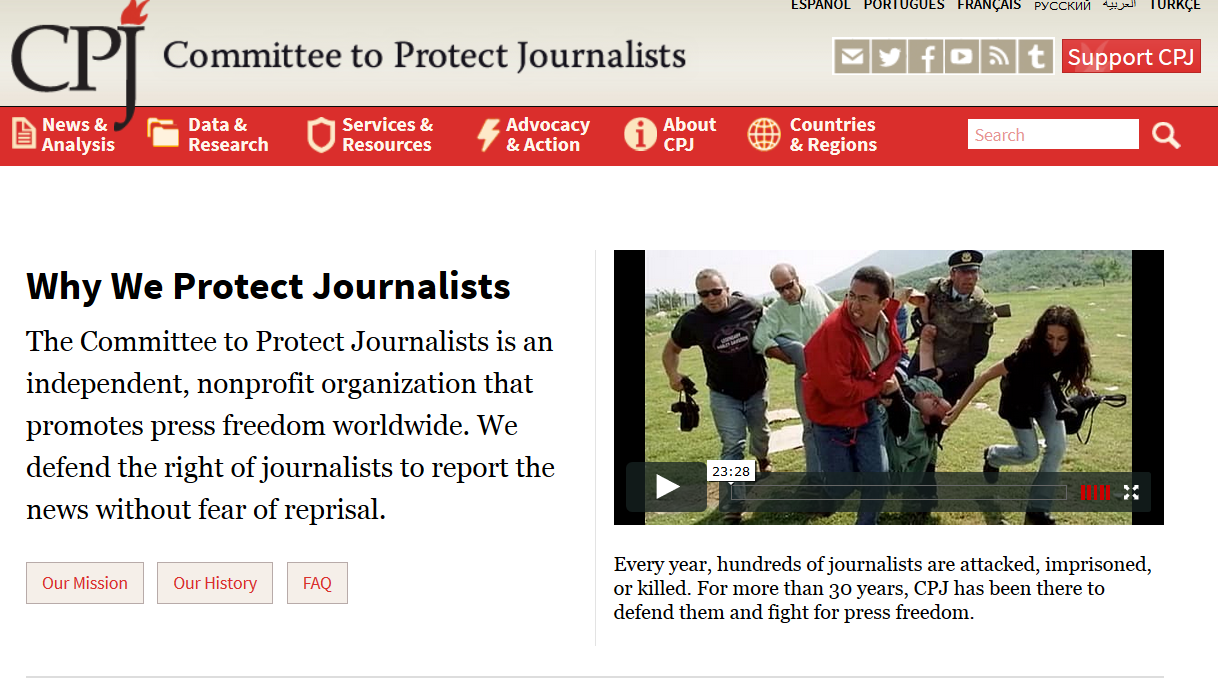New York. May 26, 2016–The NGO Committee of the United Nations voted today to deny the Committee to Protect Journalists consultative status with the Economic Social Council (ECOSOC). Without such status, CPJ is unable to access U.N. bodies and processes, notably the Human Rights Council in Geneva, where accredited NGOs can deliver a counter-narrative to states. During Thursday’s vote, six members voted in favor of CPJ’s application, 10 voted against CPJ, and three abstained. The full list of votes is available below.
The vote came after CPJ’s application, first made in 2012, was deferred seven times based on arcane U.N. procedure. The NGO Committee has recently come under criticism by human rights groups frustrated with its 19-member makeup, which includes Russia, China, Azerbaijan, South Africa, Sudan, Venezuela, and Cuba.
“It is sad that the U.N., which has taken up the issue of press freedom through Security Council and General Assembly resolutions and through the adoption of the U.N. Action Plan, has denied accreditation to CPJ, which has deep and useful knowledge that could inform decision making,” said CPJ Executive Director Joel Simon, who answered the committee’s questions on Tuesday. “A small group of countries with poor press freedom records are using bureaucratic delaying tactics to sabotage and undermine any efforts that call their own abusive policies into high relief.”
CPJ’s ECOSOC accreditation process has been one of Kafka-esqe bureaucratic limbo-an experience shared by other groups. For years, CPJ’s application has been deferred by persistent, lengthy, and repetitive questioning.
During the session, the NGO Committee hid behind the pretense of rules and procedures. For example, there were long and sometimes heated debates as to whether civil society representatives should be allowed to speak at designated points throughout the process. The arguments centered on a protest by the International Service for Human Rights (ISHR), which was eventually allowed to open the afternoon session by reading from a letter signed by 230 NGOs citing concern with the procedural tactics used to delay applications. After an hour long debate following the statement, the representative from the U.K. pointed out that ISHR took five minutes to present its findings and the committee then argued for one hour to complain about the amount of time used.
The 54-member council has the authority to override the NGO Committee’s vote and approve CPJ’s application. The council will meet in late July.
The NGO Committee voted as follows for CPJ’s application:
In favor: 6
Against: 10
Abstained: 3
Azerbaijan – no
Burundi – no
China – no
Cuba – no
Greece – yes
Guinea – yes
India – abstain
Iran – abstain
Israel – yes
Mauritania – yes
Nicaragua – no
Pakistan – no
Russia – no
South Africa – no
Sudan – no
Turkey – abstain
USA – yes
Uruguay – yes
Venezuela – no
###
CPJ is an independent, nonprofit organization that works to safeguard press freedom worldwide.
Media contact:
Samantha Libby
Advocacy Officer
Tel. +1 212 300 9007
E-mail: [email protected]
